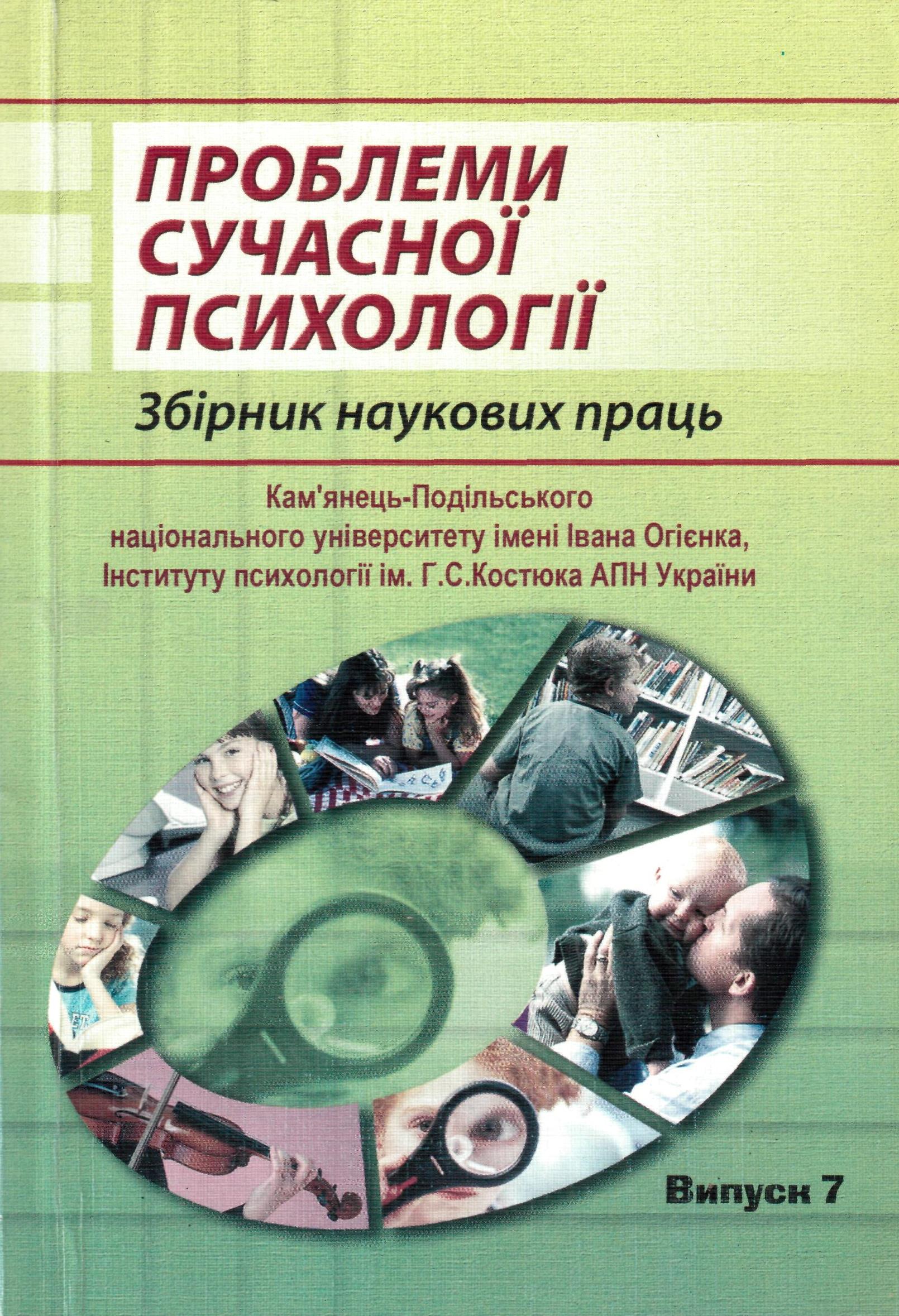Особистісні характеристики як ресурси долаючої поведінки. Огляд деяких сучасних теорій копінгу
DOI:
https://doi.org/10.32626/2227-6246.2010-7.%25pКлючові слова:
особистісні характеристики, поведінка, копінг, ресурсний підхід, життєстійкість, самоефективність, самоповага, самовпевненістьАнотація
У статті обговорюється ресурсний підхід до копінг поведінки.
Розглядаються теорії С.Хобфолла, А.Бандури, А.Антоновського,
С.Мадді та ін. Кожна з них підкреслює важливість таких особистісних
ресурсів, як відчуття когерентності, самоефективність, життєстійкість,
самоповага і самовпевненість, в детермінації успішного копінгу.
Формулюється гіпотеза, що ці поняття є певною мірою синонімічними
і/або відображають різні аспекти одного чи декількох латентних і більш
універсальних особистісних особливостей.
Посилання
Галецька І. І. Психологічні аспекти здоров’я /І.І. Га
лецька// Вісн. Львів. унів ту. Сер. філос. науки. – 2002. –
Вип. 3. – С. 428–436.
Галецька І. І. Психологічні властивості компонентів
відчуття когеренції / І.І. Галицька //Вісн. Львів. унів ту.
Сер. філос. науки. – 2005. – Вип. 8. – С. 282 292.
Леонтьев Д. А. Личностный потенциал как основа само
детерминации / Д.А. Леонтьев // Ученые записки кафедры
общей психологии МГУ. Выпуск 1 / Под общ.ред. Б. С. Бра
туся, Д. А. Леонтьева. – М.: Смысл, 2002. – С. 56 65.
Родіна Н. В. Копінг поведінка як психічна діяльність
суб’єкта /Н.В. Родіна // Вісник Одеського університету,
– Т.14/ – В.6. – С. 80 88.
Antonovsky, A. (1987). Unraveling the mystery of health.
San Francisco, CA: Jossey Bass. 218рр.
Antonovsky, A. (1990). Personality and health: Testing the
sense of coherence model. In H. S. Friedman (Ed.), Personal
ity and disease (pp. 155 177). New York: John Wiley & Sons.
Bandura, A. (1977a). Self efficacy: Toward a unifying theory
of behavioral change. Psychological Review, 84, 191 215.
Bandura, A. (1977b). Social learning theory. Englewood
Cliffs, NJ: Prentice Hall. – 247р.
Bandura A. (1989), Regulation of cognitive processes
through perceived self efficacy, DP № 25, p. 729.
Bandura, A. (1991). Self regulation of motivation through
anticipatory and selfregulatory mechanisms. In R. A. Dien
stbier (Ed.), Perspectives on motivation: Nebraska sympo
sium on motivation (Vol. 38, pp. 69 164). Lincoln: Univer
sity of Nebraska.
Bandura A., (1991 a), Social cognitive theory of moral
thought and action. In W. M. Kurtiness (Ed.) Handbook of
moral behavior and development, Vol. 1 (pp. 45 103),
Hillsdale, NJ: Erlbaum.
Bandura, A. (1994). Self efficacy. In V. S. Ramachaudran
(Ed.), Encyclopedia of human behavior (Vol. 4, pp. 71 81).
New York: Academic Press.
Bandura A., (1995 b), On rectifying conceptual ecumenism.
In J. E.Maddux (Ed.). Self efficacy, adaptation, and adjust
ment (pp. 347 375), NY: Plenum Press.
Bandura, A. (1997). Self efficacy: The exercise of control.
New York: Freeman. Р. 604.
Carver C.S. and Scheier M. F. (1998). On the Self regulation
of Behavior (p. 349). USA.: Cambridge University Press.
Frankl V., From death camp to existentialism, Beacon Press,
Boston (1959) – 67р.
Freund, A. M., & Riediger, M. (2001). What I Have and What
I Do – The role of resource loss and gain throughout life. Ap
plied Psychology: An International Review, 50(3), 370 380.
Frydenberg E. Beyond Coping. Meeting goals, visions and
challenges. Oxford University Press, 2002 p. 176
Hobfoll, S. E. (1989). Conservation of resources: A new at
tempt at conceptualizing stress. American Psychologist, 44,
No. 3, 513 524.
Hobfoll, S. E. (2001). The Influence of Culture, Commu
nity, and the Nested Self in the Stress Process: Advancing
Conservation of Resources Theory. Applied Psychology: An
International Review, 50(3), 337 421.
Lustig C., Strauser D. The relationship between sense of co
herence and career thoughts // Career Development Quar
terly. – 2002. – Sept. – P. 27–38.
Maddi S.R., Khoshaba D.M. Hardiness and Mental Health //
Journal of Personality Assessment. – 1994. – Oct. – Vol.
– N 2. – Р. 265 – 274.
Moos R. Conceptual and empirical approaches to developing
family based assessment procedures: Resolving the case of
the Family Environment Scale // Family Process. 1990. V.
P. 199 – 208.
Navon, D. (1984). Resources: A theoretical soup stone? Psy
chological Review, 91, 216 234.
Perrez, M., & Reicherts, M. (1992). Stress, coping, and
health. Seattle/Toronto: Hogrefe & Huber Publishers. – 233р
Surtees P., Wainwright N., Luben R., at al. Sense of coher
ence and mortality in men and women in the EPIC Norfolk
United Kingdom prospective cohort study // Am J. Epide
miol. – 2003. – Dec. – P. 1202–1209.
Turner R.J., Roszell P. Psychological resources and the stress
process // Stress and mental health: Contemporary issues and
prospects for the future / Ed. by W.R. Avison, J.H. Gotlib.
New York: Plenum Press, 1994. P. 179 – 209.
##submission.downloads##
Як цитувати
Номер
Розділ
Ліцензія
Редакція має повне право публікувати у Збірнику оригінальні наукові статті як результати теоретичних і експериментальних досліджень, які не знаходяться на розгляді для опублікування в інших виданнях. Автор передає редколегії Збірника права на розповсюдження електронної версії статті, а також електронної версії англомовного перекладу статті (для статей українською та російською мовою) через будь-які електронні засоби (розміщення на офіційному web-сайті Збірника, в електронних базах даних, репозитаріях та ін).
Автор публікації зберігає за собою право без узгодження з редколегією та засновниками використовувати матеріали статті: а) частково чи повністю в освітніх цілях; б) для написання власних дисертацій; в) для підготовки абстрактів, доповідей конференцій та презентацій.
Автор публікації має право розміщувати електронні копії статті (у тому числі кінцеву електронну версію, завантажену з офіційного web-сайту Збірника) на:
- персональних web-ресурсах усіх Авторів (web-сайти, web-сторінки, блоги тощо);
- web-ресурсах установ, де працюють Автори (включно з електронними інституційними репозитаріями);
- некомерційних web-ресурсах відкритого доступу (наприклад, arXiv.org).
Але в усіх випадках обов’язковою є наявність бібліографічного посилання на статтю або гіперпосилання на її електронну копію, що містяться на офіційному сайті Збірника.







